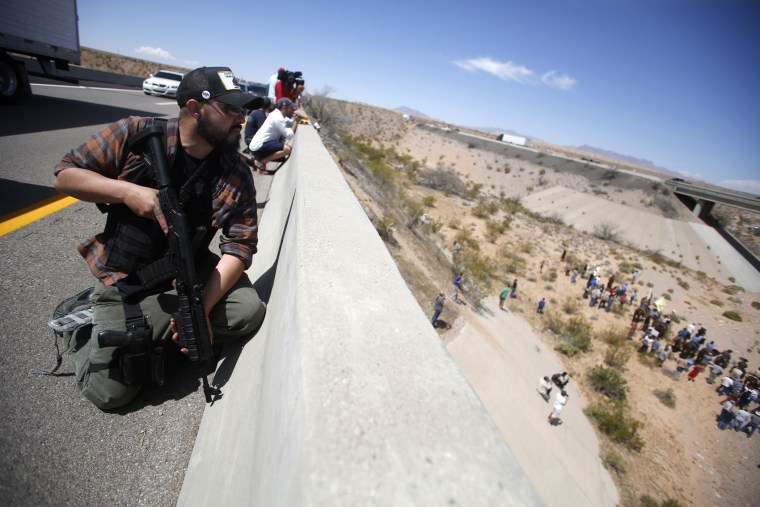It's not uncommon for conservative media to put a very different spin on current events than major news organizations. For example, news consumers who surround themselves with nothing but conservative media might believe right now that the Affordable Care Act is in a death spiral, the IRS "scandal" is heating up; the nation is facing a debt crisis; the Benghazi conspiracy will soon rock the White House; etc.
But once in a while, conservative media doesn't just put a unique spin on the news, it also identifies stories that exist largely below the radar. Over the last week, for example, far-right news consumers have been captivated with coverage of Cliven Bundy, while for much of the American mainstream, that name probably doesn't even sound familiar.
If you don't know
the story, it's time to get up to speed.
U.S. officials ended a stand-off with hundreds of armed protesters in the Nevada desert on Saturday, calling off the government's roundup of cattle it said were illegally grazing on federal land and giving about 300 animals back to the rancher who owned them. The dispute less than 80 miles northeast of Las Vegas between rancher Cliven Bundy and the U.S. Bureau of Land Management had simmered for days. Bundy had stopped paying fees for grazing his cattle on the government land and officials said he had ignored court orders. Anti-government groups, right-wing politicians and gun-rights activists camped around Bundy's ranch to support him.
By any fair definition, this was an intense standoff with a very real possibility of significant casualties.
But to understand how and why the crisis unfolded as it did over the weekend, we have to start with how it started in the first place.
Ian Millhiser did a nice job
summarizing the backstory.
This conflict arises out of rancher Cliven Bundy's many years of illegally grazing his cattle on federal lands. In 1998, a federal court ordered Bundy to cease grazing his livestock on an area of federal land known as the Bunkerville Allotment, and required him to pay the federal government $200 per day per head of cattle remaining on federal lands. Around the time it issued this order, the court also commented that "[t]he government has shown commendable restraint in allowing this trespass to continue for so long without impounding Bundy's livestock." Fifteen years later, Bundy continued to defy this court order. Last October, the federal government returned to court and obtained a new order, providing that "Bundy shall remove his livestock from the former Bunkerville Allotment within 45 days of the date hereof, and that the United States is entitled to seize and remove to impound any of Bundy's cattle that remain in trespass after 45 days of the date hereof." A third federal court order issued the same year explains that Bundy did not simply refuse to stop trespassing on federal lands -- he actually expanded the range of his trespassing. According to the third order, "Bundy's cattle have moved beyond the boundaries of the Bunkerville Allotment and are now trespassing on a broad swath of additional federal land (the "New Trespass Lands"), including public lands within the Gold Butte area that are administered by the BLM, and National Park System land within the Overton Arm and Gold Butte areas of the Lake Mead National Recreation Area." The third order also authorizes the federal government to "impound any of Bundy's cattle that remain in trespass."
So, on the one hand we have Bundy, who's
said, "I don't recognize [the] United States government as even existing." It led him to repeatedly ignore federal law, repeatedly blow federal court rulings, and refuse to pay federal fines for his transgressions. On the other hand we have the United States government -- which does, in fact, exist -- showing considerable restraint in trying to resolve the problem.
All of this started to come to a head last week, with federal officials going to the area late last week to enforce the law and seize the cattle Bundy has been illegally grazing. Except this proved to be problematic -- Bundy's heavily-armed allies,
egged on by conservative media, showed up from a variety of Western states to confront U.S. officials.
Facing the very real possibility that the anti-government forces might open fire, U.S. officials backed off in the interest of maintaining public safety.
"Based on information about conditions on the ground and in consultation with law enforcement, we have made a decision to conclude the cattle gather because of our serious concern about the safety of employees and members of the public," U.S. Bureau of Land Management Director Neil Kornze, said in a statement.
Bundy's cattle, which had been rounded up, were released. The Bundy supporters and assorted militia members were pleased, the crowds dispersed, and no one was shot.
But you probably see the problem: it's unsustainable to think a group of well-armed extremists can simply block the enforcement of American laws in the United States. It's perfectly understandable that the Bureau of Land Management saw a crisis unfolding and pulled back to prevent bloodshed, but there's an obvious problem with establishing a radical precedent: you, too, can ignore the law and disregard court rulings you don't like, just so long as you have well-armed friends pointing guns at Americans.
To put it mildly, that's not how the American system works. Indeed, that's not how any system of government can ever work.
Tensions eased over the weekend, but it seems likely that this story isn't over yet.
